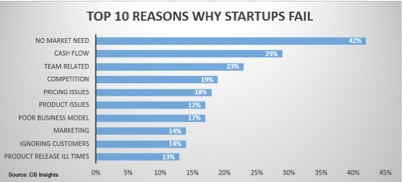5 Things to Avoid Startup Failure
5 Things to Avoid Startup Failure https://csuiteold.c-suitenetwork.com/advisors/wp-content/themes/csadvisore/images/empty/thumbnail.jpg 150 150 Kevin FitzGerald https://secure.gravatar.com/avatar/fa359dd7ed85cc9f0248546eb87cf8df?s=96&d=mm&r=g
We’ve all seen the depressing stats – over 50% of startups fail within the first 4 years. This need not happen! Businesses are launched for a variety of reasons – some are well thought out strategic launches while others are out of necessity when job prospects dry up. There are many reasons for startup failures; but if you can avoid these 5 key ones, your chances of success go way up.
Product – Market Mismatch
As the chart below demonstrates, the #1 reason why companies dissolve is that they are producing and marketing a product no one wants. Although this seems somewhat obvious in retrospect, many founders get an idea and accumulate enough funds to launch and work on perfecting their product for extended periods (burning through capital along the way) only to discover that there is no market for their product. In essence, they have a solution in search of a problem.
The way to avoid this problem is to test the market as soon as possible. Many startups are scrapping the lengthy business plan in favor of a more dynamic approach. One of the key tenants of the Lean Startup Approach centers on creating a minimally acceptable prototype that is then market tested with real potential clients. Based on customer feedback, the product is adjusted and then retested.
Lack of Funding
Even for those founders who are fortunate enough to obtain some funding, there can be a short runway until the money runs out. Startups need to develop a summary of all expected startup expenses as well as ongoing monthly expenses….leave nothing out. A cash flow budget will quickly reveal the burn rate of the business and (in the absence of revenue) how long their funds will last. This will help founders plan how to allocate their limited resources. In many ways startups are a race against time – not only to avoid running out of money, but also to stay ahead of potential new competitive entrants who may also be working on the same problem.
Founder Team
Founders may start out as solopreneurs, but soon will outgrow that and need additional expertise and support. The key potential disruptors here are personalities that don’t mesh and lack of a common vision. The best founder teams are those that knew each other before joining the company – the longer the better. As founders add additional personnel, there is a dangerous tendency of hiring quickly to “just get it done” and get some help. Hiring the wrong people can destroy a startup. If the new addition is a poor fit with the rest of the team or if they don’t share the same sense of mission this can spell significant trouble. The result will be stress within the team and some loss of momentum. Startups cannot afford to lose time or momentum.
Founders tend to have a view that they must do everything themselves to be sure it’s done right. As the business grows, this must stop. Founders are now leading the company – they need to learn to delegate whether to freelancers or fulltime employees. Leadership involves focusing on what you do best and letting others do the rest. Trust but verify is a workable approach.
“It doesn’t make sense to hire smart people and then tell them what to do; We hire smart people so they can tell us what to do.”
~Steve Jobs

Lack of a Business Plan
Business Plans are not just for Angel Investors or Venture Capitalist. They keep the management team focused and moving in the agreed upon direction. The key elements include a mission statement along with the Unique Selling Proposition (USP). A detailed summary of the competition along with marketing and business development activities is also essential. Every member of the founder’s team must be part of the process to assure buy-in on all goals. In addition, the cash flow budgets fits into this process to assure the founder that the burn rate is not too high. The danger is that funds will run out before the product is fully developed and sales have begun.
Lack of Brand Development
Successful startups need a defined repeatable sales process. But first they must get their brand noticed in the marketplace. Once the founder team has developed their Unique Selling Proposition; it needs to be conveyed to potential customers. Social media can be a big help. A solid website which includes a call to action and a way for prospective customers to ask questions has become table stakes for all businesses. Well-crafted informational articles distributed on Twitter and LinkedIn can also reinforce the brand. This is a slow burn approach, as social media cannot produce results over night. The drumbeat message should always include what specific problem the product is solving.
Final Thoughts
Starting and running a business is hard work and it may seem that success is a low probability outcome. But with planning and focused execution, a positive outcome is much more likely. It is also best not to go it alone. Seek the advice of professionals – CPAs, and attorneys along with a business mentor or coach will help the founder keep out of trouble and protect their franchise.
Kevin FitzGerald is the founder of KevinBizGobal and a C-Suite Network Advisor working with entrepreneurs and business leaders from startup to international expansion.
Kevin has over 20 years of managerial/consulting experience across a wide range of industries including Financial Services, Pharmaceuticals, Tech and MedTech. Key services include: Lean Startup Advice, Business Plan and Pitch Deck Preparation. For larger SMEs who are ready to scale internationally – go to market strategies with strategic alliances primarily in the US, Ireland, and the UK.
Kevin’s education includes an MBA from the Stern Business School at New York University and a BA with honors in Economics from Drew University.
Contact Kevin: kevin@kevinbizglobal.com
Specialties: #startup #startups #entrepreneur #entrepreneurs #businessplans #pitchdeck #pitchdecks #scaleup #InternationalExpansion #CSuite

